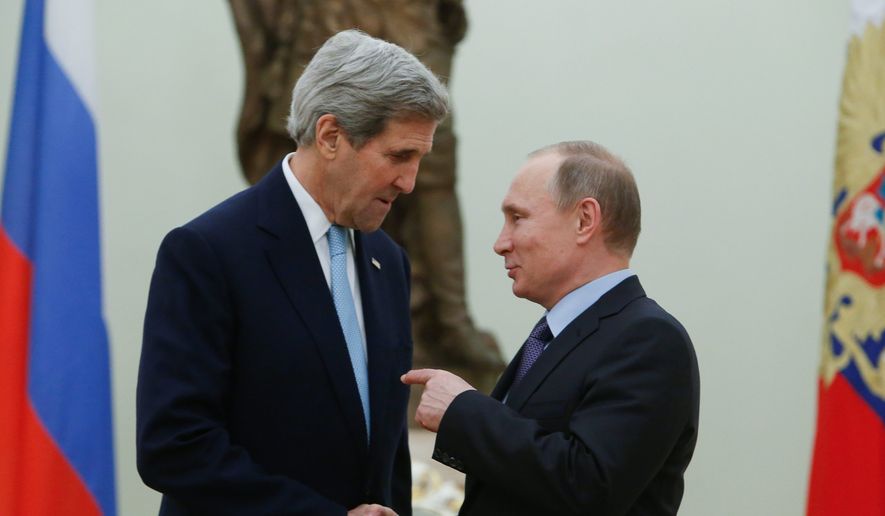Having apparently abandoned demands for the immediate departure of Syrian President Bashar Assad, the Obama administration will push anew Friday for international powers — including key Assad allies Russia and Iran — to back peace talks aimed at ending the country’s bloody 4-year-old, multifront civil war.
But the Obama administration and its Western allies appear still badly divided over Mr. Assad’s role in the peace talks, let alone his ultimate fate as a leader.
Secretary of State John F. Kerry made headlines Tuesday by asserting after meeting with Russian President Vladimir Putin that the U.S. and its allies “are not seeking so-called regime change” in Syria — a departure from years of rhetoric from President Obama and other top U.S. officials demanding Mr. Assad’s ouster. Many saw Mr. Kerry’s remarks as a recognition of the key role of Mr. Putin, whose military forces have escalated their support for the regime in Syria.
On Wednesday, U.S. Ambassador to the United Nations Samantha Power seemed to walk back Mr. Kerry’s comments, asserting that the administration’s position on Mr. Assad has not changed.
“There is going to have to be a political transition and Assad will have to go,” Ms. Power said in New York, where Friday’s meeting of the International Syrian Support Group, which includes the U.S., Russia, Iran, Saudi Arabia, Germany, France and a host of other nations, is slated to occur.
A central focus, Ms. Power said, will be “gaps” among American, Russian and Iranian positions on the fate of Mr. Assad.
Mr. Kerry has said the meeting will lead to a U.N. Security Council resolution on a process to broker a cease-fire in Syria, as well as political talks between the Assad regime and rebels backed by the U.S., Saudi Arabia and others.
But the lack of clarity over Mr. Assad’s fate continues to bedevil the talks.
German Chancellor Angela Merkel insisted that the goal of diplomacy in Syria’s war is to reach a long-term solution that does not involve Mr. Assad.
“This is about ending the war in Syria without Assad,” she said Wednesday to applause from lawmakers in Germany’s lower house of parliament, the Bundestag. “Assad can never be part of a long-term solution.”
U.N. Secretary-General Ban Ki-moon rejected that precondition, saying the push for peace should not be held up by a disagreement over the fate of the Syrian president.
“It’s up to [the] Syrian people who should make a decision about the future of President Assad,” Mr. Ban told reporters during an end-of-the-year press conference in New York on Wednesday.
“At the same time,” he added, “I also believe that it is unacceptable that the whole Syrian crisis and the solution to this crisis has to depend upon just the question of the fate of one man.”
Momentum for a Syria deal gained steam last week when members of several rebel factions agreed at a conference in Saudi Arabia to establish a “supreme council” to select 15 representatives for talks with the regime.
But major uncertainties loom. There is no timetable for talks, and there is a major question over how the Islamic State and other jihadi groups excluded from the talks will respond.
The issue of Mr. Assad’s role has been sticky since Hillary Clinton, as secretary of state, said in April 2012 that she and other Obama administration officials felt that “Assad must go.”
The assertion was seconded by other U.S. officials, who argued that the Syrian dictator could not remain in power because he had authorized his nation’s military to carry out genocide-type attacks — including the use of chemical weapons — on Syrian civilians.
The civil war began when Mr. Assad, a member of Syria’s Alawite minority, violently crushed a pro-democracy movement in 2011. Since then, the government has battled U.S.-backed rebel groups as well as Islamic State and al Qaeda-linked groups as the country descended into chaos.
Mr. Kerry said this week that the Obama administration still does not “believe that Assad himself has the ability to be able to lead the future Syria” but that the Syrian president retains strong backing from Tehran and Moscow for now.
The fate of Mr. Assad and other Middle Eastern strongmen was a topic of spirited debate Tuesday night among Republican presidential candidates, who were sharply divided over whether removing dictators such as Mr. Assad, Iraq’s Saddam Hussein and Libya’s Moammar Gadhafi served U.S. interests.
Donald Trump and Sen. Rand Paul of Kentucky said at the Las Vegas debate that U.S. support for regime change in Arab states was costly and disastrous. Sen. Ted Cruz of Texas, warned, “If we topple Assad, the result will be ISIS will take over Syria, and it will worsen U.S. national security interests.
“We need to learn from history,” said Mr. Cruz. “Obama, Clinton and far too many Republicans want to topple Assad. Assad is a bad man. Gadhafi was a bad man. [Former Egyptian President Hosni] Mubarak had a terrible human rights record. But they were assisting us — at least Gadhafi and Mubarak — in fighting radical Islamic terrorists.”
Sen. Marco Rubio of Florida and Ohio Gov. John Kasich forcefully argued that Mr. Assad had to go in any lasting peace deal, if only to contain the regional ambitions of his ally Iran.
“He has to go,” Mr. Kasich declared. “Assad is aligned with Iran and Russia. The one thing we want to prevent is Iran being able to extend a Shia crescent all across the Middle East. Assad has got to go.”
• Guy Taylor can be reached at gtaylor@washingtontimes.com.




Please read our comment policy before commenting.